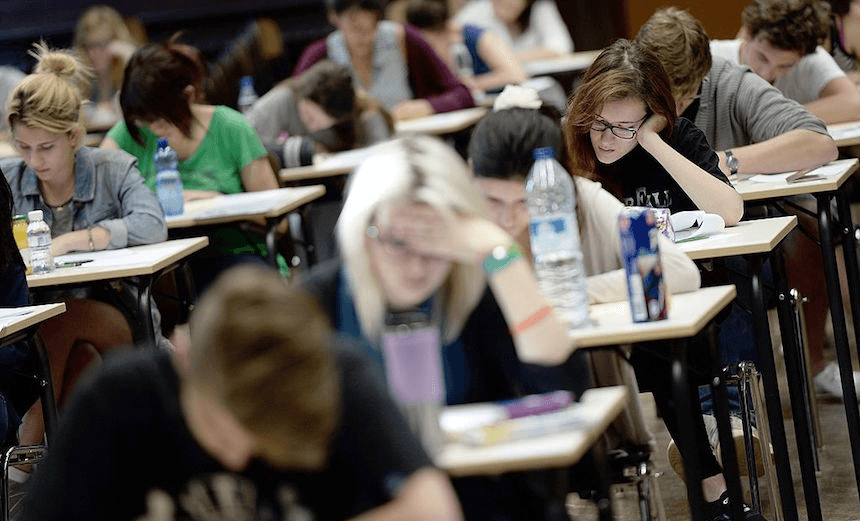Following an outcry, the NZQA has agreed to a review of its policy of publishing exemplar answers that students have been memorising and reproducing. It’s all part of a larger problem, writes AUT lecturer Peter Gilderdale, of ‘academic obedience’ over actual learning.
Think of a place where doping is both prevalent and systemic in a public institution and you’re probably thinking sports in Russia or East Germany, right? I’m going to argue that such doping occurs right here in New Zealand – in our education system.
I don’t, of course, mean that schools are secretly feeding students speed before exams. The educational doping I’m talking about here won’t show up in a urine test. Rather, it’s what happens when learners are helped to achieve assessment results that exceed their actual levels of capability.
Education is supposed to promote learning. But learning can be short-changed quite easily, once the primary goal becomes achieving measurable results.
The dark side of measurable standards is that they can be faked. This happens when the learning that ought to have preceded the assessment (and which would have allowed the student to improve long term) is by-passed through excessive assistance. It’s hard to spot at the time, but is obvious afterwards: once the help is removed, students relapse to where they were before, just as sporting dopers’ results plummet when they come off the drug.
In both sport and education, doping thrives when a healthy striving for quality is replaced by an unscrupulous desire to succeed at all costs. But in sport we can (mostly) tell when people are doping – and there are penalties for doing it. In education, there are no standards for measuring doping, and plenty of rewards for dopers and their coaches.
So who are these coaches, and how do they do it? Well, while you might think these would only be teachers, some of the more persistent doping early on is probably done by parents. There is a big difference between helping a child to understand their homework task (which is fine), and doing it for them (which is not).
I remember once overhearing a parent essentially write their child’s speech for them. They clearly intended to draw out the child’s ideas, but every time the child had an idea, the parent discarded it and inserted one of their own. I’m sure that child gave an amazing speech. But could they have gone away the next day and written a speech of an equivalent standard on their own? Most certainly not.
They got the result, but not the associated learning. They were doped.
And that’s the problem for educational institutions when tests and measurable standards are used to judge performance. It’s easier for administrators to focus on whether their students are achieving top results than on whether they are actually learning.
Granted, good teachers will always play fair and resist pressure to short-change the learning process. But it must be hard for them when the system gives equal (and maybe higher) rewards to colleagues who show their students how to get undeservedly spectacular results, rather than simply guiding them to achieve the best they are capable of.
Violations of the learning process are usually labelled ‘cheating’ or ‘plagiarism’. Both indicate that students are doing something that gains them an unfair advantage and provides them the appearance of knowledge they don’t actually possess. Both signpost moral deficiencies on the student’s part.
The reason we need to expand the discussion to include doping is that doping also implicates the coaches. And when we look at it this way, it may encourage parents, teachers and the educational system itself to reflect more fully on whether they may be facilitating (consciously or unconsciously) unhealthy learning behaviours.
Many teachers I know have remarked on a recent epidemic of students who expect their teachers to provide step-by-step roadmaps that guarantee an ‘Excellence’ or an A+. These students are overtly demanding (in effect) to be doped – they want results that will give them a pat on the back, but not the effort of achieving these through genuine learning. This is not traditional cheating. Cheating is a clandestine behaviour, but these students seem to regard doping behaviours as normal and acceptable.
So why is this occurring? Inevitably the reasons are complex. In part, they may relate to both students and teachers feeling that they lack time, but it is hard to avoid seeing a broader connection to global educational reform.
Since the 1980s, these reforms have furnished us with a competitive, outcome-oriented, assessment-heavy system. In it, the primary educational emphasis skews away from focussing on the processes that facilitate learning towards demonstrable and measurable results.
Many educators have complained about this shift, pointing to the success of systems like those in Finland – which have resisted the rhetoric of standardisation, privatisation and competition – but to little avail.
But what, ultimately, are the implications of these developments? Do we risk fostering a generation that increasingly expects to be told what to do – one that aces assessments and excels at managing time efficiently while increasingly lacking creativity, questioning, independence, entrepreneurship, resilience and imagination?
These latter qualities flourish when people are allowed to experiment broadly, fail freely and learn from the experience. A system that rewards results even when the learning experiences of experimentation and failure have been circumvented is a recipe for doping. And dopes.
Peter Gilderdale is a senior lecturer in Communication Design at AUT
The Society section is sponsored by AUT. As a contemporary university we’re focused on providing exceptional learning experiences, developing impactful research and forging strong industry partnerships. Start your university journey with us today.
